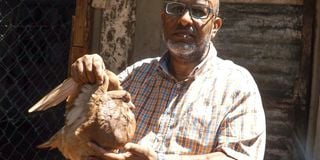Beautiful business of rearing pigeons, doves

Salim Mbarak holds a pigeon at his establishment in Kilifi County. The farmer is a pigeon enthusiast and has invested in the birds, keeping various breeds, alongside doves. PHOTO | BOZO JENJE | NATION MEDIA GROUP
What you need to know:
- The farmer is a pigeon enthusiast and has invested in the birds, keeping various breeds, alongside doves.
- Smarting from the failed chicken project, Mbarak was introduced by a friend to dove and pigeon farming last year.
- The doves went for Sh200 each and the pigeons Sh30,000 a pair, with the farmer spending over Sh300,000.
- Mature doves and pigeons start to lay eggs in a specially made grass nest at three months.
Located in Mwezang’ombe–Bofa, about 2km away from the sandy beaches of Kilifi County, the two-acre farm is surrounded by a high stone wall.
Inside the farm named Davao, one is welcomed by the sounds of pigeons cooing and palm trees whistling as they dance to a cool breeze blowing from the Indian Ocean.
“This is a pigeon and dove kingdom,” Salim Mbarak, 57, the owner of the farm, says in jest.
The farmer is a pigeon enthusiast and has invested in the birds, keeping various breeds, alongside doves.
But he did not start with pigeons. In 2018, with his brother Mbarak Nassib, they built four poultry houses, bought a 50-egg incubator and 200 Kenbrow day-old chicks at Sh120 each to start the project.
The initiative went on well, with the two selling a majority of the birds and his family consuming some.
“It was a good start because I sold the birds at Sh1,000 each for meat,” he explains.
Buoyed by the feat, they introduced improved kienyeji birds for eggs and meat but things did not go as expected as most of them died.
“I kept the rest until they started laying eggs and then opted out of chicken business because of high cost of production. Feeds were expensive and few people were willing to buy fertilised eggs at Sh20 each,” says Mbarak.
Smarting from the failed chicken project, Mbarak was introduced by a friend to dove and pigeon farming last year.
EASY TO REAR
“I modified the chicken coops by constructing small compartments for the birds because they love them that way. I also erected their rest zones and feeders in an enclosure where they stay when they come out of their cages.”
The farmer started with 10 pairs of doves, six pairs of the spectacular white Indian fantail pigeons, two pairs of the American fantail and Fichier pigeons and a pair Cauneu rouge pigeons.
The doves went for Sh200 each and the pigeons Sh30,000 a pair, with the farmer spending over Sh300,000.
“I have 150 doves and pigeons on the farm in total,” says Mbarak, noting only size differentiates the birds, with doves being smaller and mostly white.
George Danda, the farm manager, says pigeons and doves are easy to rear and are beautiful to watch as they fly around and their cooing is therapeutic.
“Doves and pigeons are clean birds and not labour-intensive. They need adequate food that includes grains and water in containers to bathe at least twice every week.”

Some of the birds that the farmer keeps at his farm named Davao in Kilifi County. He has 150 doves and pigeons on the farm in total. PHOTO | BOZO JENJE | NATION MEDIA GROUP
They feed them mainly maize bran, millet and sunflower seeds, though they can also consume peas, wheat, groundnuts and insects.
“The two birds stay mostly in pairs and can live for up to 15 years, thus one had better keep an even number. They are very faithful birds; the female sticks to her male partner without switching to another,” he observes.
Mature doves and pigeons start to lay eggs in a specially made grass nest at three months. They lay two eggs at most, which hatch after 18 days into squabs that are cared by both the male and female birds.
ORNAMENTAL VALUE
“The squabs are fed by the female pigeons through the mouth until they reach a month old. We then start to feed them on grains,” he says, adding that they keep the doves and birds separately.
At three to four months, they are mature and ready to start a new life cycle as couples.
“At this stage, you can sell them or eat them,” says Ganda, adding a pair of doves goes for Sh400 and the ornamental pigeons Sh15,000. Pigeon and dove eggs go for Sh30 each.
Apart from keeping the birds for their ornamental value and eggs, Mbarak loves eating dove meat, noting it is lean and has less fat. The pigeons are mainly kept for ornamental purposes.
“But I don’t eat any, only the black ones. The white doves and pigeons are for breeding and sale. The meat is superb when cooked or roasted after they mature in three to four months.”
Some of the threats to the birds include snakes, mites and rats, parasites like roundworms and tapeworms and diseases such as diarrhoea, cholera, Newcastle and tuberculosis.
“When they are sick, we call a veterinary officer to provide proper treatment and we also vaccinate them,” Danda states, adding they also keep three bantams, guinea fowl, Pekin ducks and five geese.
Mbarak says he had employed two workers for the project but had to release one due to challenges arising from Covid-19 pandemic.
Dorcas Libuku, a veterinary doctor based in Kikambala, says pigeons and doves require cleaner spaces and good ventilation to reduce the chances of diseases.
“They are exotic birds and they are economical to keep but not many rear them because the of the high cost of the parent stock. Farmers need training to understand skills required to keep the birds profitably.”




